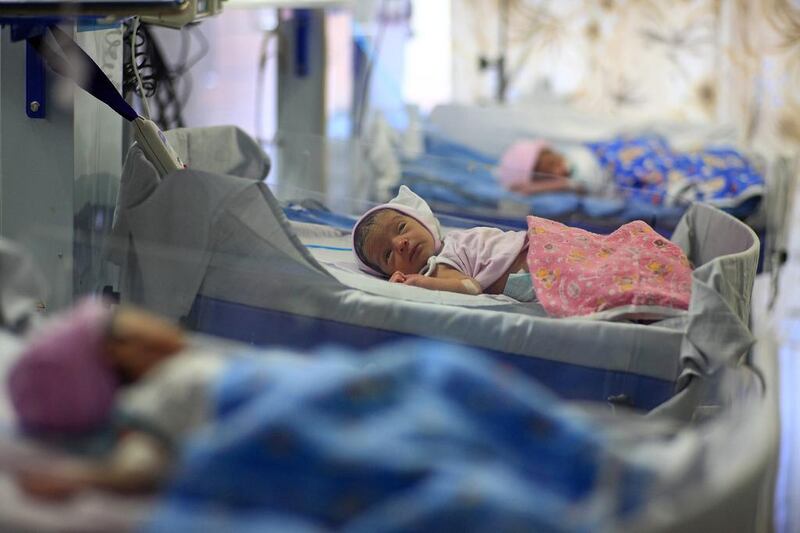NEW DELHI // India’s government is trying to prevent foreigners from using Indian women as surrogates, a move that could cripple the country’s multibillion-dollar “reproductive tourism” industry.
“The government does not support commercial surrogacy,” the state said in an affidavit filed in the supreme court on October 28. “No foreigner can avail surrogacy services in India.”
It came a day after the Indian Council of Medical Research, a government body, ordered roughly 100 surrogacy clinics, “not to entertain any foreigners for availing surrogacy services in India”.
This instruction was temporarily set aside by the Bombay high court on Wednesday, to allow clinics that have already begun surrogacy treatments to complete them. The respite will also allow the supreme court to proceed with its hearings and arrive at a decision.
The government affidavit was filed in response to a public-interest lawsuit brought by Jayashree Wad, a New Delhi-based lawyer, in February. Ms Wad alleged that the surrogacy industry was exploiting poor Indian women, turning India into a “baby factory”.
“A commercial element is introduced, and Indian women are exploited, and substantial benefit is derived by doctors, hospitals and institutions involved in it,” Ms Wad said at the time. “This amounts to exploitation of women for commercial gains.”
The next hearing of the case in the supreme court is on November 24.
When the court admitted Ms Wad’s suit, it asked relevant Indian ministries to file affidavits in response, pointing out that other countries, such as South Korea, had instituted similar bans.
“We need to look into the larger issues involved in the petition,” two-judge bench said.
According to 2012 figures from the Confederation of Indian Industry (CII), a non-government trade body, roughly 10,000 foreign couples visit India to use surrogacy services every year. The figure is only likely to have grown since then. The fertility tourism industry generates roughly US$2.3 billion (Dh8.4bn) a year, CII estimated.
The industry is frequently referred to as “rent-a-womb”, for the ease with which foreign couples can choose to implant their fertilised embryos in Indian women, paying them to carry and then give birth to the babies.
The expense of such a service in India vastly undercuts similar rates in western countries. A study by the Centre for Social Research (CSR), a New Delhi-based non-profit, cited an example of a 37-year-old Russian who came to India to find a surrogate mother.
In Russia, such a service would have cost her between 1.5 million (Dh83,595) and 2 million rupees, the CSR study found. In India, the service cost 200,000 rupees.
A survey undertaken by the CSR study in the state of Gujarat, where fertility clinics thrive in the towns of Anand, Surat and Jamnagar, found that 38 per cent of surrogate mothers earn between 1,000 and 2,000 rupees per month in their normal employment. For such women, payments running into hundreds of thousands of rupees can represent substantial windfalls.
But Manasi Mishra, who heads CSR's research division, told The National that surrogate mothers often receive only a third or a quarter of the promised amount, with doctors or middlemen deducting fees and expenses.
“The problem is, surrogate mothers usually never have a copy of a contract,” Dr Mishra said. “So they don’t know, for example, that they will have to go through a Caesarean operation, or that if they get gestational diabetes or hypertension, they will be tended to at their own cost.”
Dr Mishra said India urgently needed a regulatory framework to tackle these problems, with a national database of surrogacy arrangements, so that the rights of surrogate mothers are protected.
But she is against a ban on foreigners using surrogacy services in India.
At the moment, between 70 and 80 per cent of couples who hire Indian surrogate mothers are foreigners, she said. Banning these couples will deprive many women of an income that they are entitled to, should they choose to act as surrogate mothers.
“Our fear and apprehension is that if such bans are instituted, the whole thing will move underground,” Dr Mishra said. “Women will still choose to be surrogate mothers, to make money, but they’ll have even less bargaining capacity than they do now.”
Shivani Sachdev Gour, a New Delhi-based doctor who has conducted several surrogacy treatments, insisted that the government was “painting the whole industry with a black brush only because [of] a few bad cases. With the large majority of surrogacy treatments, there has been no problem at all,” Dr Gour said, countering the CSR’s claim that surrogate mothers are often denied full payment or receive inadequate post-natal treatment.
He outlined several measures that are already in place to regulate surrogacy.
Couples have to seek a special visa from Indian embassies before arriving in the country. They have to register with a police station and with the home ministry before the treatment, and then repeat these registrations after the baby has been born.
“Sure, there are some bad cases,” Dr Gour said. “But then you should form rules to eliminate those cases. You shouldn’t make innocent people suffer. You shouldn’t deny the benefits of surrogacy to thousands of childless couples.”
ssubramanian@thenational.ae





